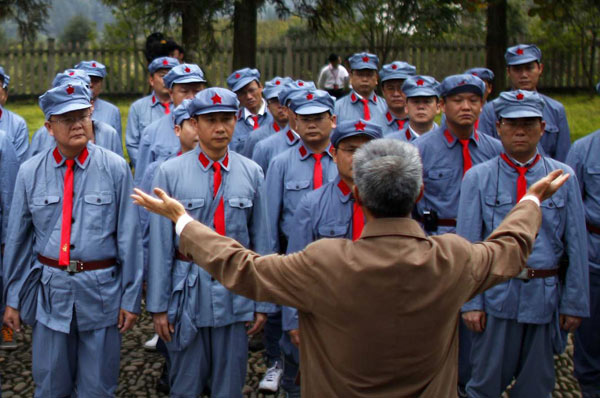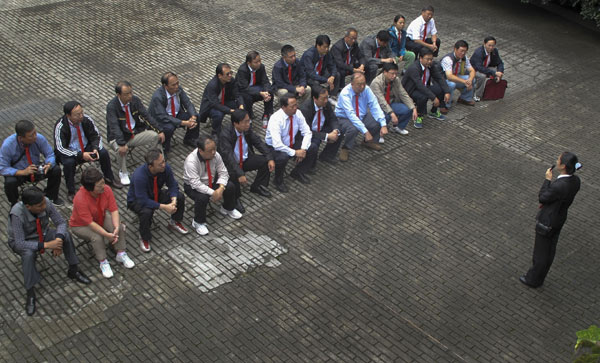A school where leadership is nurtured
Updated: 2012-09-26 08:18
By He Na in Jinggangshan, Jiangxi province and Wang Hongyi in Shanghai (China Daily)
|
||||||||
Party education focuses on tradition of service and sacrifice, report He Na in Jinggangshan, Jiangxi province and Wang Hongyi in Shanghai.
 |
|
Government officials dressed in Red Army uniforms visit an old house where Chairman Mao Zedong once lived as part of their five-day training course at the China Executive Leadership Academy at Jinggangshan in Jiangxi province last week. Carlos Barria / Reuters |
Almost every day the historic site at Huangyangjie welcomes groups of special visitors. The site commemorates a decisive Red Army victory against overwhelming Kuomintang forces at Jinggangshan, China's revolutionary cradle in Jiangxi province.
Dressed in the grey uniform of the Red Army or sporting a red ribbon, they looked more like soldiers than tourists, but unlike regular tourists, who immediately begin taking photos or buying souvenirs, the visitors sat on benches and listened as a woman related the history of the site. Several wept as they listened to the tales of war and sacrifice.
When the woman sang a revolutionary song about blood flowing as red as the azaleas that blossom across the mountains and plains, the visitors sang along and the strains of their song filled the site. The sound caused many tourists to stop and listen, including Zhan Yang, a 25-year-old accountant from Hunan province, who was visiting the site with her family.
"I thought they must be people from a company who had come to receive military training. However, I was surprised to learn that they were all high-level government officials on a training course," she said.
"I always assumed that officials at that level are surrounded by people wherever they go, and that they always criticized or taught others. I couldn't believe that they behaved just like students. I was really curious about their studies," she admitted.
To the man and woman in the street, the academies that train government officials are mysterious places. People wonder what they look like inside and what the officials learn there.
 |
|
Senior officials at a class in Huangyangjie, a historic site in Jinggangshan. He Na / China Daily |
Importance of training
"Everybody needs to study and it's especially important for officials. It's not good enough to depend simply on self-study. Group study at executive leadership academies is an effective channel for updating their knowledge and deepening their understanding of the Communist Party. The courses can improve their ability to cope with rapid changes in the world and society," Mei Liming, executive vice-president of the China Executive Leadership Academy, Jinggangshan, said at a news conference on Sept 21.
Aiming to strengthen leadership education and to build a high-quality leadership team, the central government established three Executive Leadership Academies in 2005: Jinggangshan and Yan'an in Shannxi province; and Pudong in Shanghai.
The academies at Jinggangshan and Yan'an specialize in teaching Party history, team building, revolutionary tradition and basic social conditions. The students include Party and government officials, company executives and army officers. Meanwhile, the academy at Pudong focuses on social improvement and economic development.
Official students
"The study period for officials at the level above bureau chief at Jinggangshan is 10 days. Just like students at a school, we also live in a dormitory, have classes every day and eat in the canteen. The difference is that we are learning how to be good leaders," said Yuan Meisheng, director of the finance and accounting department of China Co-ops International Business, which oversees a number of aspects of agricultural production.
"Although I am a PhD and have worked for many years, my understanding of the Party is still very limited and there's so much I'm unfamiliar with. To improve your work, you must study. More importantly, many Party workers nowadays have lost a lot of the good traditions championed by officials in days gone by. For example, in the past, at meetings of the Party committee, people would be harshly criticized for making mistakes. However, nowadays it's more like an award ceremony. No one wants to tell the truth, which is really bad for the Party's development. We really need to restore those good traditions," he said.
Zhang Zhonghua, Party secretary of the Civil Aviation Administration in the Xinjiang Uygur autonomous region was also enthusiastic about the training regime.
"My work is very time-consuming and this is a really good opportunity to leave it for a short period and totally immerse myself in study," he said.
"After the classes, I kept asking myself how people in the past could be prepared to sacrifice their lives in the interests of others. And, would I have had the courage to do the same thing? I've really gained a lot from this training and deepened my understanding of the Party. Although living standards have improved and China has become the world's second-largest economy, those good traditions have never changed or dated. They can still guide our work," he said.
Nestled in Jinggangshan, the campus blends ecology with practicality. The buildings echo the ancient Hui style in design, but are equipped with all mod cons. By the end of August, the academy had held 789 training classes, attended by 39,245 trainees.
"Most of the education centered on Party theory and tradition was previously delivered in formal classrooms and seemed abstract, empty and boring. To stimulate enthusiasm among the students and make a deep impression on them, we altered the teaching method to combine classroom work with experimental teaching at historic spots and field research," said Ke Hua, director of the Academic Department.
Key to this approach is the use of the experimental scenario, and we make full use of Jinggangshan's revolutionary resources, exploring 87 scenes, featuring historic sites, memorials, museums and a huge number of villages, he said.
According to Zhang Younan, the Jiangxi academy's vice-president, teachers play a vital role in improving the level of education. "To build a high-quality group of teachers, we established a very strict selection process. Our teachers are the elite in their fields and are very experienced. In addition, we also developed a large group of visiting teachers, made up of experts, government officials and people noted for their good moral standing," he said.
Educational content
"For our on-the-spot education, the teachers help the students to recreate the original scenes through detailed narration and commentary. The atmosphere naturally helps the students to put themselves in the shoes of those who lived through these events, it's a form of time travel, and the events resonate in their hearts," said Ke.
"When I tell the students about how the old leaders and high-ranking officials carried grain on shoulder-poles along bumpy roads, I am sure they think of their own lives and wonder if they are setting a good example for those they lead," said Wei Qingyuan, a professor at the academy.
"We should teach our officials that in the past the people of Jinggangshan would go without food so they could leave the grain for the Red Army, but nowadays although living standards have improved greatly, there are still complaints about the government and officials. The officials need to review them," he added.
"It's my second time at Jinggangshan, and the experimental education at historic sites seemed to take me back to the hardships in the past. The previous generations of Party members and others helped to bring about today's comfortable life. As leaders, we cannot betray the people's trust," said Lin Hanmin, director of the administrative examination and approval department of Hainan Administration for Industry and Commerce.
Zhang Dechang, director of the organization department of the Yangpu Economic Development Zone in Hainan, said he hoped to arrange for young officials in his area to receive similar training.
"Education is especially important for young officials to help them learn more about the hardships the previous generations endured and prevent them from becoming addicted to luxurious lifestyles, power and money," he said.
"Our training program only lasted five days, which I thought was too short. To fully make use of this precious time, I read the books written by former leaders that were left in our rooms, but I also borrowed several Marxist classics from the library," he said.
Past meets present
According to Mei Liming, the integration of past and the present is another innovation the academy uses in its teaching program.
"We arrange discussion classes so students can compare similar cases, both recent and those from decades ago. Most of the topics are related to current hot issues and protests, and we use them to teach students how to deal with these issues in accordance with traditional methods," he said.
We have designed different courses to meet different demands. Those for government officials focus on how to improve relations between them and the people, while those designed for executives concentrate on raising their sense of social responsibility, said Ke.
"The majority of officials are good, but we need to admit that there are still some people who only think of themselves. The government has experienced various problems in recent years, mainly because some officials lost their faith that the Party serves the interests of the people," said history professor Wei Qingyuan.
"The education of officials is a sacred task. They are the backbone of the country. If they study well and behave correctly, the country can have a better future," he said.
Contact the reporters at hena@chinadaily.com.cn and wanghongyi@chinadaily.com.cn
Zhang Yuchen also contributed.

 Relief reaches isolated village
Relief reaches isolated village
 Rainfall poses new threats to quake-hit region
Rainfall poses new threats to quake-hit region
 Funerals begin for Boston bombing victims
Funerals begin for Boston bombing victims
 Quake takeaway from China's Air Force
Quake takeaway from China's Air Force
 Obama celebrates young inventors at science fair
Obama celebrates young inventors at science fair
 Earth Day marked around the world
Earth Day marked around the world
 Volunteer team helping students find sense of normalcy
Volunteer team helping students find sense of normalcy
 Ethnic groups quick to join rescue efforts
Ethnic groups quick to join rescue efforts
Most Viewed
Editor's Picks

|

|

|

|

|

|
Today's Top News
Health new priority for quake zone
Xi meets US top military officer
Japan's boats driven out of Diaoyu
China mulls online shopping legislation
Bird flu death toll rises to 22
Putin appoints new ambassador to China
Japanese ships blocked from Diaoyu Islands
Inspired by Guan, more Chinese pick up golf
US Weekly

|

|







